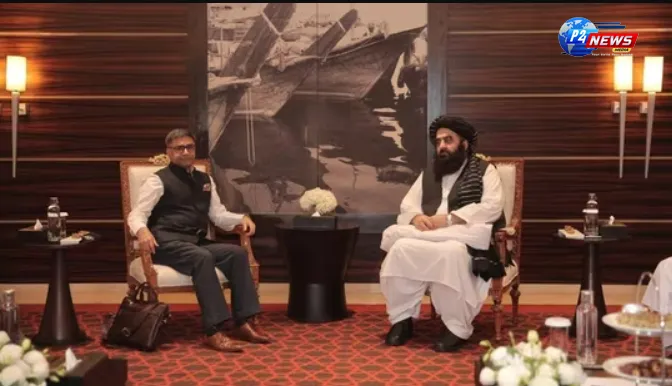The meeting reflects India's ongoing dialogue with the Taliban government in Kabul, despite not officially recognizing its authority, demonstrating India's strategic interest in regional stability and diplomatic engagement.
The meeting reflects India's ongoing dialogue with the Taliban government in Kabul, despite not officially recognizing its authority, demonstrating India's strategic interest in regional stability and diplomatic engagement.
In a significant diplomatic development, the Afghan Taliban expressed its awareness of India’s security concerns during a meeting between Indian Foreign Secretary Vikram Misri and Taliban’s Acting Foreign Minister Amir Khan Muttaqi in Dubai. This meeting, which took place on Wednesday, marked the first official acknowledgment of high-level dialogue between New Delhi and the Taliban leadership.
During this pivotal engagement, the Indian officials reiterated their commitment to support Afghanistan, specifically in the health sector and in the rehabilitation of refugees. This meeting is part of India’s ongoing outreach to the Taliban regime in Kabul, which India has yet to formally recognize. The discourse was largely steered by the foreign ministry’s Afghanistan point person, JP Singh, emphasizing the strategic importance of this engagement.
The Indian external affairs ministry, in its summary of the meeting, noted that the Afghan delegation highlighted its understanding of India’s security priorities. However, specific details were not disclosed. According to sources familiar with the discussions, India remains vigilant regarding the presence of multiple fighters from Pakistan-based terror organizations, including Lashkar-e-Taiba and Jaish-e-Mohammed, in Afghanistan. Past conversations have seen India urging the Taliban to prevent any anti-India activities from being conducted on Afghan soil.
The backdrop of this dialogue includes Pakistan’s expulsion of over 500,000 Afghan refugees, which has added urgency to India’s proposal for assisting in the rehabilitation of these individuals. The two sides exchanged views on enhancing bilateral ties and discussed regional issues while agreeing to advance the utilization of the Chabahar port in Iran. This port is seen as a vital hub for trade and humanitarian assistance to Afghanistan, helping India circumvent transportation routes through Pakistan.
A terminal at Chabahar port operated by an Indian state-run entity is pivotal for India’s trade strategies. India and Iran had previously entered into a 10-year agreement to operate at this port, utilizing it for humanitarian shipments to Afghanistan over the last few years.
During the meeting, Misri emphasized India’s long-standing friendship with the Afghan populace, underscoring strong people-to-people connections and India’s willingness to address the pressing developmental needs of the Afghan people. The discussion also covered enhancing cooperation in sports, particularly cricket, as a means to foster further engagement.
Both sides reviewed the current humanitarian assistance initiatives undertaken by India, with Muttaqi expressing gratitude to Indian leadership for its continued support towards the Afghan populace. The talks also indicated a willingness to explore development projects in Afghanistan in the near future, in addition to ongoing humanitarian efforts.
Following the Taliban's takeover of Kabul in mid-2021, India's various development projects, funded through grants and soft loans, were put on hold, and the country evacuated its diplomatic personnel. In 2022, India re-established a limited presence in Kabul by deploying a technical team to the embassy.
In terms of humanitarian aid, India has been proactive, dispatching essential supplies like 50,000 tonnes of wheat, 300 tonnes of medicines, and over a million doses of polio and Covid vaccines, alongside other critical supplies including earthquake relief materials, winter clothing, and hygiene kits for drug de-addiction programs.
The meeting concluded with both parties agreeing to maintain communication and foster regular interactions at various levels. Prior to Misri’s discussions with the Taliban minister, much of India’s engagement with Kabul's regime was managed by JP Singh, who previously met the Taliban’s acting defense minister, Mohammad Yaqoob, signaling a gradual expansion of India’s diplomatic overtures towards the new Afghan leadership.
It is noteworthy that this meeting followed India’s condemnation of recent airstrikes by Pakistan in Afghanistan that reportedly resulted in numerous civilian casualties. India criticized Pakistan for attempting to shift blame for its domestic challenges onto neighboring countries, highlighting the complexities of regional security dynamics.
Like
Dislike
Love
Angry
Sad
Funny
Pray
'Trump Tracker: Tulsi Gabbard's Surprising Appointment as US Intelligence Chief
November 14, 20249th Ayurveda Day in Melbourne: A Celebration of Ayurvedic Innovations and Global Health Impact
November 10, 2024🍪 We Value Your Privacy and Experience Hi there! We use cookies to enhance your browsing experience, provide personalized content, and analyze site traffic. By continuing to use our site, you consent to our use of cookies.







Comments 0